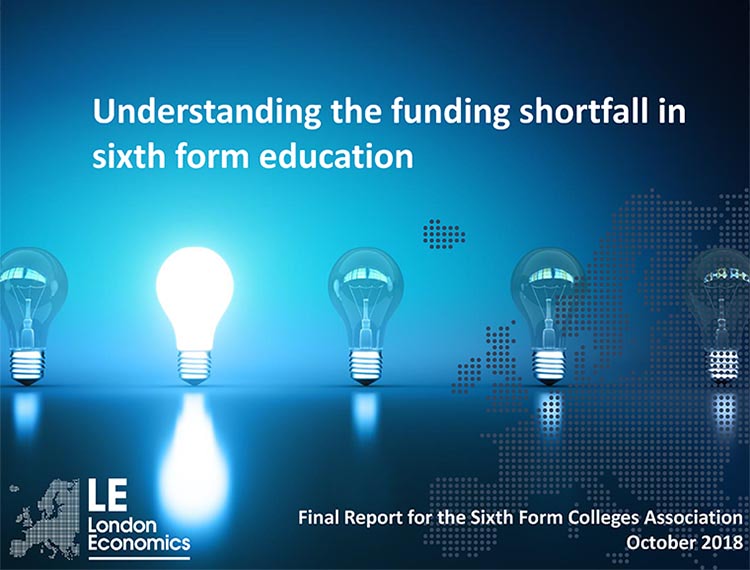New report highlights £760 per student funding gap in Sixth Form Colleges

There is a £760 per student shortfall between the funding that Sixth Form Colleges receive and the amount they need to educate their students according to a report published today.
The report Understanding the funding shortfall in sixth form education was produced by London Economics on behalf of the Sixth Form Colleges Association. It shows the dramatic impact of the government freeze on sixth form funding combined with a sharp increase in running costs. The report found that:
- Sixth Form Colleges need an increase in funding of at least £760 per student in 2020/21 to continue providing a high quality education to young people
- This funding is the minimum required to:
- Increase student support services to the required level (e.g. improving the mental and physical health of students)
- Protect minority subjects that are at risk of being dropped (e.g. modern foreign languages)
- Increase non-qualification time (e.g. extra-curricular activities, work experience, university visits)
- Sixth Form Colleges will require a further £140 per student in 2020/21 if the proposed increase in employer contributions to the Teachers’ Pension Scheme is not fully funded by the government
- In real terms, Sixth Form Colleges received £1,380 less per student in 2016/17 than they did in 2010/11 – a 22% decline in funding
- The number of teachers in Sixth Form Colleges decreased by 15% during the same period as a result of funding pressures (from an average of 97 per college to 82), but the number of students increased by 6% (from an average of 1,702 per college to 1,806)
Commenting on the report, Bill Watkin, Chief Executive of the Sixth Form Colleges Association, said:
“It is now well understood that sixth form education has experienced deeper funding cuts since 2010 than any other phase of education. But until the publication of today’s report, the impact of cost increases has been less well understood. The debate about sixth form funding now needs to move from how much funding has been cut, to how much funding is actually needed to provide the sort of high quality, internationally-competitive education that our young people deserve.
“We now have a minimum figure – £760 per student – but this will need to increase by a further £140 per student if the government does not fully fund the proposed increase in employer contributions to the Teachers’ Pension Scheme. We will launch the Raise the Rate campaign later this month in partnership with a range of other school and college associations to help secure a significant increase in the funding rate for sixth form students in next year’s spending review”.
Maike Halterbeck, an Associate Director at London Economics and primary author of the report said:
“The ongoing cuts to sixth form education have caused a significant reduction in the resources available for front-line teaching activity. This has resulted in a narrowing of the curriculum on offer – and a narrowing of the opportunities available to more than 150,000 young people. Significant additional financial resources should be provided to properly fund young people’s education and provide them with an internationally competitive sixth form curriculum.”
Employer contributions to the Teachers’ Pension Scheme will increase from September 2019 – early indications are that this will be from 16.48% to 23.6%. Although it is likely the government will meet the cost of the increase in 2019/20, decisions beyond that point will depend on the outcome of the spending review.
The Sixth Form Colleges Association is the established voice of dedicated sixth form education and the hub of a national network of sixth form providers. SFCA represents all designated sixth form colleges and 16-19 academies in England, as well as a growing number of Further Education colleges and 16-19 free schools.
London Economics is one of Europe’s leading specialist economics and policy consultancies. Providing independent world-class research in finance and economics, LE advise a wide range public and private sector clients across the United Kingdom and beyond on a vast range of issues involving education and labour market economics.











Responses